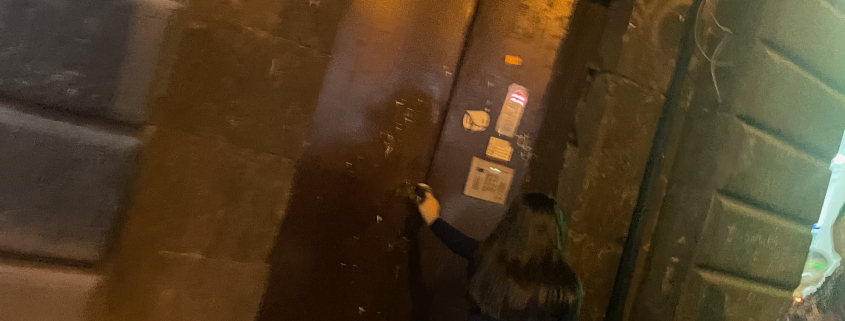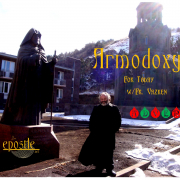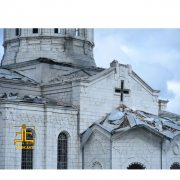Overturning
Armodoxy for Today: Overturning
At the first Palm Sunday, that is, when Jesus entered Jerusalem to meet his appointment with the Cross, he saw a scene in the temple which infuriated him. We read in Matthew 21:12-13: Jesus entered the temple courts and drove out all who were buying and selling there. He overturned the tables of the money changers and the benches of those selling doves. “It is written,” he said to them, “‘My house will be called a house of prayer,’ but you are making it ‘a den of robbers.’” This event is sometimes referred to as “Jesus cleansing the temple” because he “cleaned out” all that did not belong there.
Considering that marketing professionals are now selling products under the “Christmas in July” banner, I didn’t hesitate to draw from another period on the Church calendar, namely Palm Sunday, to point to what doesn’t belong on our shopping list. We have been conditioned by what used to be called Madison Avenue, a street in New York City where many advertising agencies have offices and, today, by more elite methods that melt us down to mathematical formulas governed by algorithms. And we react. Christmas, we know is a season for shopping. It’s a season where sales are permissible. And so, if they tell us it’s Christmas in July, much like Pavlov’s dogs, we begin salivating at the chance to bite off some bargains.
Armodoxy is the study of ancient Orthodoxy as it pertains to our lives today. And just as much as the ancient traditions influence us, the methods and practices of today turn our head and direct our feet to follow our glance.
As much as Jesus’s actions in the temple were about cleansing the house of God, his action of overturning the tables, is also memorialized in this story. The phrase “cleansing the temple” is a description someone gave the story. Turning the tables, is the action Jesus took. As Christians, we may draw from these actions and make them metaphors for Christian living. For instance, let us begin with this popular sales pitch we came face-to-face with this year: Christmas in July. One option would have been to resist it, call if for what it is, a ploy to put cash into the economy at the expense of Christ’s name. That would be akin to “cleansing the temple.” But in his action to turn the tables, Jesus brought attention to the seriousness of the temple itself – a house of prayer. In opting for the overturn metaphor, we are turning the table on what is presented to us. In Christ’s words, “Do not resist evil.” We’re not resisting it, rather giving it a chance to work for our goals.
Here’s what happened this week on our “Path to Armodoxy.” We learned that we were being sold “Christmas in July.” We did not resist what was given, rather we took the concept and presented Christmas as a Christian. We spoke about Jesus being born – Christmas – to a world that did not want to be bothered – no room at the inn. We connected to the story of the Down Syndrome children – Fr. Gregor’s Arev Children – in Armenia. We saw the difference one man can make in the lives of so many. In essence, we turned the tables on the advertisers and sold Christmas – Christian Love – in July, rather than the made-in-China products the others were peddling.
Armodoxy is not a rejection of this life, but an understanding to allow us to work in harmony within this life. Jesus did not reject the life of this world. He pointed to something higher that could be attained in the here-and-now. The stories about which we reflect are all stories from our lives today. They are stories to inspire us to work out our Christianity in this world.
Throughout our travels in Armenia, the ever-looming threat of another unexpected attack by the enemy was present. The blockade and destruction of a portion of Armenia, namely Artsakh, was a daily reality we confronted, and the people of Artsakh are enduring it. The temple-cleansing model seems appropriate and efficient, but is it realistic? The overturning model is an approach which takes the reality and uses it to channel a better outcome. Just as we did, Christmas in July became a sale where the work of a good priest in Armenia and the Arev Children became the “sale items” for us.
We live in a world that has issues which some define as problems and others refer to them as challenges. Cleansing the Temple – cleaning everything out – sounds good, but is it possible? Remember, the phrase “cleansing the temple” is what people called what Jesus did. Jesus was more strategic. He turned over the tables and in so doing, the temple remained while the insides were cleaned up and set in order.
Let us pray, Lord Jesus, enter my holy temple and turn over the tables that have set up shop. Turn over misunderstanding to understanding, judgement to tolerance, and hatred to love. Guide and direct my actions to so that your will of peace and harmony become my goals. Amen.


 2025 Fr Vazken
2025 Fr Vazken 2025 Fr Vazken
2025 Fr Vazken 2009 Fr. Vazken Movsesian
2009 Fr. Vazken Movsesian




 2023 Fr. Vazken Movsesian
2023 Fr. Vazken Movsesian
Leave a Reply
Want to join the discussion?Feel free to contribute!